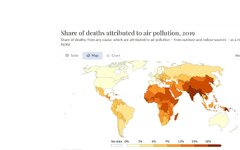The "hidden elephant in the room" in all these discussions about the human over-population problem is there is no feasible way to quickly reduce the population to sustainable levels.
Nah, the hidden elephant in the room is that people just assume there's such a thing as "the human over-population problem", and proceed as though this were a fact universally acknowledged and recognised, and not a notion that is held as a tenet of faith, but completely lacking in evidence.
I mean, if you could identify a "sustainable" level
of population (you can't), then it would almost certainly be unfeasible (a nice euphemism for "genocidal") to rapidly reduce population to that level; But without that first step of determining what the sustainable level of population is, the whole question of how to commit sufficient genocide cannot sensibly be considered.
There's no such thing as "the sustainable level of population"; Consequently, "overpopulation" is also not a thing.
The concept of sustainability applies only to specific activities. There's a sustainable level of fossil fuel burning, below which the various natural sinks for carbon dioxide will remove the gas from the atmosphere as quickly as it is produced. But that level isn't proportional to population; A million Frenchmen today produce about half the carbon dioxide generated by a million Germans; An average Qatari produces about the same amount as five hundred average Congolese.
And sustainability need not only consider natural sinks. If we extract carbon dioxide from the atmosphere artificially, that sustainable amount of burning increases accordingly.
The factors we need to consider, in order to determine what level of fossil fuel burning is sustainable are therefore:
1) What natural sinks exist
2) What artificial sinks exist
3)
Global population
The addition of that third factor is clearly absurd.
And we can do the same analysis for any pollutant, and any kind of resource extraction. Each such analysis will provide a measure of the total amount of 'activity X' that can be sustained indefinitely; And a measure of how much harm any unsustainable rate of 'activity X' will cause.
There exist no technological activities for which "global population" is an input to a calculation of the amount of that activity actually occurs; Nor for which it is an input to a calculation of how much of that activity is sustainable.
If we ask "how much fossil fuel is burned per capita?", we discover that the answer isn't constant, or even close to constant. It varies with time, and with geography, and even between individuals at any arbitrary level of granularity. Two members of the same household can easily have wildly differing 'carbon footprints'.
Population is just not a useful variable to consider, when looking at sustainability.
Population is a red herring. It's a pointless distraction, which adds nothing helpful to any discussion of environmental sustainability. And as that discussion is of critical importance, it's vital that we stop wasting time worrying about population.


 Keep your "eye on the ball," please. The comment about plastics was NOT to show that over-population is a problem. It was to refute bilby's claim that only the very rich are responsible for a lion's share of pollution. It was one of several facts I presented showing that, in many cases, it is the POOR countries which produce most pollution.
Keep your "eye on the ball," please. The comment about plastics was NOT to show that over-population is a problem. It was to refute bilby's claim that only the very rich are responsible for a lion's share of pollution. It was one of several facts I presented showing that, in many cases, it is the POOR countries which produce most pollution.